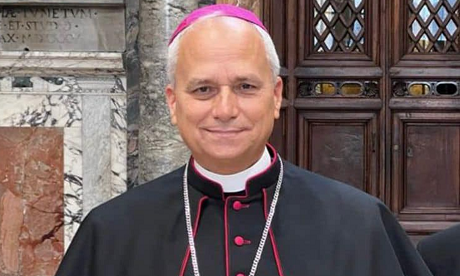The Vatican says more lay people should help choose bishops.
Listening to the people of God is important, says newly-appointed Dicastery for Bishops’ head Archbishop Robert Prevost (pictured).
A good bishop is “a pastor, capable of being close to the members of the community, starting with the priests for whom the bishop is father and brother,” Prevost says.
He must be able “to live this closeness to all, without excluding anyone.”
While nuncios are asked to consult with some laypeople when identifying potential candidates to serve as bishops, that consultation should expand, he says.
“We had an interesting reflection among the members of the Dicastery on this issue.”
Because a bishop is called to serve an entire diocese, not just the priests, “listening to the people of God is also important.
“If a candidate is not known by anyone among his people, it is difficult — not impossible, but difficult — for him to truly become pastor of a community, of a local church.
“So, it is important that the process is a little more open to listening to different members of the community.”
This doesn’t mean a local church chooses its pastor, “as if being called to be a bishop was the result of a democratic vote.”
Broader view
Prevost thinks a much broader view is needed, and the apostolic nunciatures help a lot.
“I believe that little by little we need to open up more, to listen a little more to the religious and the laity.”
A good bishop does not “give in to the temptation to live isolated, separated in a palace, satisfied with a certain social level or a certain level within the Church.
“And we must not hide behind an idea of authority that no longer makes sense today. The authority we have is to serve, to accompany priests, to be pastors and teachers.”
He noted the preoccupation with teaching doctrine and how to live the faith.
But we risk forgetting our first task – to teach what it means to know Jesus Christ and to bear witness to our closeness to the Lord, he says.
“This comes first: to communicate the beauty of the faith, the beauty and joy of knowing Jesus. It means that we ourselves are living it and sharing this experience.”
Church unity
Three key theme words in the synod on synodality are participation, communion and mission, he says. They describe a bishop’s role in the church.
“The bishop is called to this charism, to live the spirit of communion, to promote unity in the church, unity with the Pope.”
That is part of being Catholic, “because without Peter, where is the church? Jesus prayed for this at the Last Supper, ‘That all may be one,’ and it is this unity that we wish to see in the Church.”
“The lack of unity is a wound that the Church suffers, a very painful one.
“Divisions and polemics in the church do not help anything. We bishops especially must accelerate this movement toward unity, toward communion in the church.”
Source
